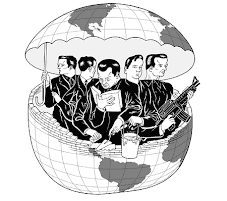PARIS: Is the United States no longer the global beacon of unfettered, free-market capitalism?
In extending a last-minute $85 billion lifeline to AIG, the troubled insurer, Washington has not only turned away from decades of rhetoric about the virtues of the free market and the dangers of government intervention, it has also likely undercut future American efforts to promote such policies abroad.
"I fear the government has passed the point of no return," says Ron Chernow, a leading American financial historian. "We have the irony of a free-market administration doing things that the most liberal Democratic administration would never have been doing in its wildest dreams."
While they acknowledge the shock of the collapse of Lehman Brothers, the bailout package for AIG on top of earlier government support for Bear Stearns, Fannie Mae, and Freddie Mac has stunned even European policy makers accustomed to government intervention in the economy.
"For opponents of free markets in Europe and elsewhere, this is a wonderful opportunity to invoke the American example," said Mario Monti, the former antitrust chief at the European Commission. "They will say that even the standard-bearer of the market economy, the U.S, negates its fundamental principles in its behavior."
Monti noted that past financial crises in Asia, Russia, and Mexico brought government to the fore, "but this is the first time it's in the heart of capitalism, which is enormously more damaging in terms of the credibility of the market economy."
In France, where the government has long supported the creation of national champions and worked actively to protect select companies from the threat of foreign takeover, politicians were quick to point out the paradox of what is essentially the nationalization of the largest American insurance company.
"Today the actions of American policy makers illustrate the need for economic patriotism," said Bernard Carayon, a lawmaker of President Nicolas Sarkozy's center-right governing party, UMP. "I congratulate them."
For the "evangelists of the market this is a painful lesson," he added. We're entering "an era where we have much more regulation and where the public and the private sector will mix much more."
In Asia, the Washington-led bailouts have stirred bitter memories of the very different approach the U.S. government and the International Monetary Fund pushed during the economic crises there a decade ago.
When the IMF pledged $20 billion to help South Korea survive the Asian financial crisis of the late 1990s, one of the conditions it imposed was that the Korean government allow ailing banks and other companies to collapse rather than bail them out, recalls Yung Chul Park, a professor of economics at Korea University in Seoul who was deeply involved in the negotiations with the IMF.
While Park says the current crisis is different - it's global rather than restricted to one region like Asia - "Washington is following a different script this time."
"I understand why they do it," he added. "But they've lost credibility to some extent in pushing for opening up overseas markets to foreign competition and liberalizing economies."
The ramifications of the rescue of AIG will be felt for years within the United States, too, not just abroad.
That's because it was a very different kind of company than Fannie Mae or Freddie Mac, which enjoyed government sponsorship as mortgage finance providers, or Bear Stearns, which was regulated by the federal government.
"This was an insurance company that wasn't federally regulated," says Gary Gensler, who served as a top official in the Treasury Department during the Clinton administration. Nor did AIG have access to Federal Reserve funds or deposit insurance, like a commercial bank.
"We're in new territory," Gensler added. "This is a paradigm shift."
AIG is also in a different league both by virtue of the breath of its businesses and its extensive overseas operations, especially in Asia.
What's more, it fell into something of a regulatory gap under the current rules.
While the company, based in New York, is better known for selling conventional products like insurance policies and annuities overseen by state regulators in the United States, it is also deeply involved in the risky, opaque market for derivatives and other complicated financial instruments, which operates largely outside any regulation.
Along with the threat to the plain-vanilla insurance policies held by millions of ordinary consumers, it was the looming threat posed by these arcane financial instruments that prompted Washington to act and bailout AIG.
Chernow, who has written extensively about the efforts of J.P. Morgan to steady the economy in 1907 before the creation of the Federal Reserve, echoed Gensler's conclusion.
"It's pure crisis management," Chernow said. "It's the Treasury and the Federal Reserve lurching from crisis to crisis without a clear statement on how financial failures will be handled in the future. They're afraid to articulate such a policy. The safety net they are spreading seems to widen every day with no end in sight."



No comments:
Post a Comment